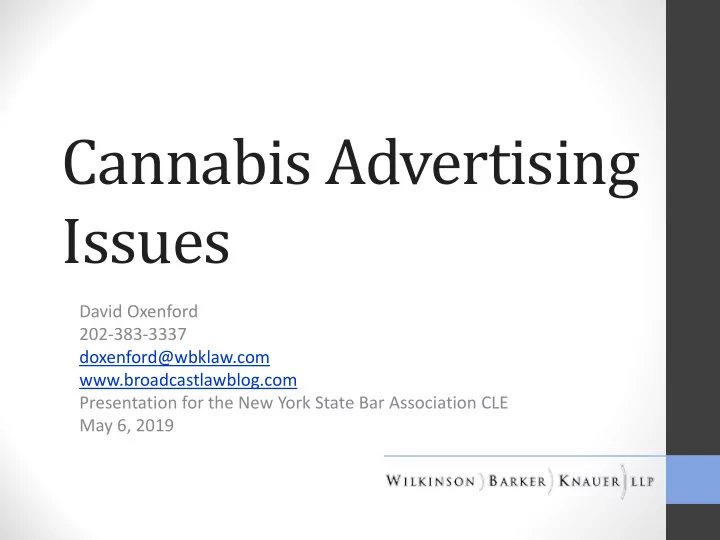

Cannabis Advertising Issues David Oxenford 202-383-3337 doxenford@wbklaw.com www.broadcastlawblog.com Presentation for the New York State Bar Association CLE May 6, 2019
Where I am coming from • Communications lawyer – working with broadcasters and other media companies • Since the first legalized medical marijuana, we have been inundated with questions from clients who want to run ads • Requests trended up after Colorado and Washington State “legalized” marijuana – and more come in as each state takes its own action • A flood of questions after the Farm Act of 2018 – particularly for CBD products • So what’s the story?
Risk Assessment – The Laws • Obviously – marijuana is still a Schedule I drug under Federal law • Felony to sell under Controlled Substances Act • Also felony to aid and abet distribution using the Internet, or to advertise the sale of controlled substance • And a felony to use any communications facility “in causing or facilitating the commission of any act or acts” illegal under the Act • Prohibition against ads in newspapers, magazines and other publications offering to distribute or buy controlled substances • See 21 USC § 843 (b) and (c) • But DOJ prohibited from spending funds to prevent any state from implementing their own laws on medical marijuana – Section 537 Conference Report on Budget Bill from February 2019 • Interpreted by at least one court to mean no prosecutions of medical marijuana sales pursuant to state laws – US v. McIntosh , 833 F. 3d 1163 (9 th Cir. 2016) • While it has been in place for years, the budget rider adding this language ends on October 1, 2019 and no assurance of renewal (it did lapse for several months during budget fight earlier this year), and prosecutions for current conduct are theoretically possible
Risk Assessment – Regulatory Agencies • Broadcasters have concerns about FCC licenses • Broadcasters have to have the “character qualifications” to be an FCC licensee – felony convictions and other egregious conduct can be considered • FCC licenses are renewed every 8 years – 3 year cycle in which radio renewals are filed starts next month – TV next year – where the public can comment on how they have served the public interest • US Postal Service 2015 threat to prevent distribution of publications with drug ads • FTC and FDA issues with advertisements making unproven health claims or which are otherwise deceptive – more on that in a minute
Where does that leave media companies? • Most broadcasters currently passing on marijuana ads – even for medical marijuana • Many big Internet companies also passing • Print is a mixed bag, with smaller shoppers and alternative papers the usual spot for dispensary ads • Some billboards carrying CBD/medical marijuana ads in states where legal • Impossible for attorneys to give opinions that there is no risk
CBD – A Different Dynamic • Hemp-derived CBD no longer on Schedule I; marijuana still a Schedule I drug • Possession of hemp-derived CBD is no longer a Federal crime • Production and distribution is supposed to be legalized by states under plans to be approved by the USDA (2018 Farm Act) or more generally under a nationwide plan approved by the USDA • While a few states have submitted their plans, none have been approved • No rules in place for approving the plans – though USDA held hearings • Unclear what the timeline is for approving plans – supposedly will be ready for 2020 growing season • In the interim, only legally produced CBD is that grown and distributed under experimental programs authorized by the 2014 Farm Act • Allowed for experimental uses – including commercial experiments • Was not expected to be widespread distribution • Someone may have miscalculated – as there is lots of CDB on the market • Also watch state laws, as some have not caught up – some with more restrictions on CBD than on “legalized” marijuana
Other Considerations • No marketing to children • Most states and companies follow DISCUS Rules – 71.6% of audience must be of legal age • No health claims about the products – recent FTC/FDA letter to distributors who made claims • No edibles or dietary supplements unless approved by the FDA (one epilepsy drug) – recent FTC/FDA letter on that too, and several state actions against distributors • FDA hearing scheduled for May 31 to review these limits • Good practices - media should also look for evidence that products are legally produced and distributed
Results • Hearing many more CBD ads – and seeing them in print • Also ads for hemp products • If no CBD or THC (active ingredient in marijuana), 2014 Farm Bill legalized hemp products • We’ve seen ads for hemp beer – which has been approved by US Alcohol and Tobacco and Trade Bureau (“TTB”) – may be the safest of all cannabis products to market if approved in your state • Otherwise, there is still lots of confusion to be resolved in coming years – leaving advertising and marketing in a bit of a haze
Cannabis Advertising Issues David Oxenford 202-383-3337 doxenford@wbklaw.com www.broadcastlawblog.com Presentation for the New York State Bar Association CLE May 6, 2019
Recommend
More recommend